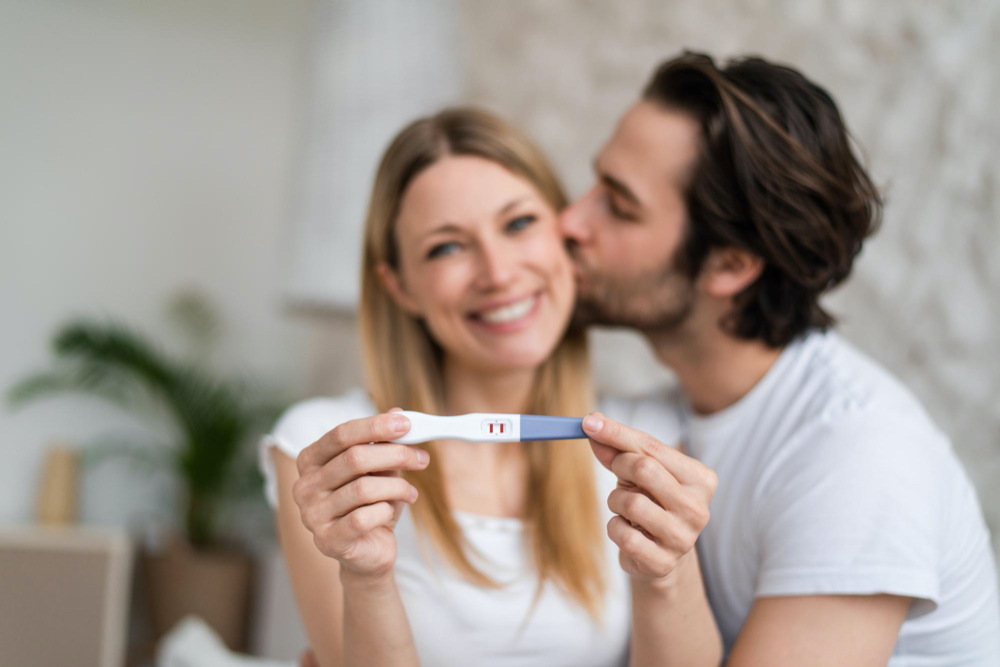- Fast results
- 4,000+ locations
- 4.8 star rating
Need Help? (888) GET LABS



Having problems conceiving a child? It’s a tough situation, but it helps to know that you are not alone.
Many women experience difficulties in getting pregnant or sustaining a pregnancy despite adjusting their lifestyle. Some have successfully addressed the reason behind their fertility problems, while others remain baffled.
Nonetheless, like any other medical issue, infertility can be treated by identifying what is causing the condition and focusing treatment on said issue.
But if you wish to supplement treatment or simply improve your fertility before you even begin trying to get pregnant, there are practical ways you can follow.
Read on and find out how to boost female fertility.
According to the CDC, 6% of women within fertile ages fail to get pregnant after a year of trying. While the statistical number may be less than 10%, fertility issues continue to be an important topic not just among couples who want children but among researchers as well.
One significant finding that multiple studies have shown is the continuous decrease in the American birthrate within almost a decade.
The COVID-19 pandemic was expected to change the game in the US birth rate trend. As couples increased their time together during the lockdown, it was assumed that intimacy and sexual intercourse would increase, resulting in a “baby boom.” Instead, however, declines in birth rates are still being recorded in various states.
A critical factor for this remarkable drop in the number of babies being born is female fertility. Evidently, as more women are more inclined to get pregnant at a later age compared to decades ago, the likelihood of fertility issues increases.
Nevertheless, even if age is a significant factor, women can still pursue pregnancy, especially if the following actions are undertaken.
Once you and your spouse try to get pregnant, it’s pretty common to hear plenty of advice from other couples who have become parents themselves already. One of which is that frequent sex increases the chances of conception.
While there is a little truth about this advice, it does not completely guarantee a pregnancy. Hence, couples who engage in sexual intercourse often get frustrated when the results they expect don’t come through.
The truth is it doesn’t matter how frequent the sexual intercourse is as long as you keep a schedule that works around your ovulation.

Ovulation is the period during a woman’s menstrual cycle wherein the ovary releases a single mature egg cell to the fallopian tube. In some instances, multiple egg cells are released, producing fraternal twins when fertilized.
However, the egg cell will only be viable for fertilization within 12 to 24 hours. Missing this fertile window will obviously mean that no pregnancy will take place.
The American College of Obstetricians and Gynecologists suggest the highest chance of fertilization occurs when the sperm meets the egg cell during ovulation.
In a 28-day cycle, the ovulation period is at day 14. If you have irregular periods, this is where you ask the help of your gynecologist or obstetrician to perfectly hit the right day.
But if this is not achieved, fertilization can still occur if the sexual intercourse happened 3 to 5 days prior to ovulation. This is because sperm cells can survive the female body for the said duration.
Fertility is often determined by how low or high your female hormone levels are. After all, the production and release of sex cells are regulated by hormones.
Endocrine disorders are highly associated with infertility, with polycystic ovarian syndrome (PCOS) having caused fertility issues to about 70 to 80% of infertile women. This is why checking your fertility hormone levels is the foundation of many fertility treatments.
Here are the hormones you need to watch out for when you are trying to get pregnant:
FSH is responsible for the production and release of the egg cell and estrogen. Therefore, inadequate or too much FSH can affect ovulation and cause problems related to fertilization.
Low estrogen can hinder ovulation. Likewise, since it is responsible for the thickening of the uterine lining, it can also prevent the embryo’ (fertilized egg) to the uterus walls.
LH is responsible for the production of progesterone which is necessary for a healthy pregnancy. Therefore, irregular levels of LH could suggest issues with egg cell production.
Progesterone is released after ovulation to prepare your body for the implantation of the embryo to the uterine walls. Inadequate progesterone can interrupt implantation, which means that even if fertilization occurred, pregnancy will still not happen.
If a woman is not pregnant or breastfeeding, it is expected that prolactin should be at low levels. When prolactin is too high, it prevents the production and release of estrogen, which disrupts ovulation.
Thyroxine, a hormone secreted by the thyroid gland, can affect fertility once it gets too high or too low. It can prevent ovulation or shorten the release of other critical sex hormones.
By extension, the thyroid-stimulating hormone can also affect fertility as it regulates the production of thyroid hormones.
DHEA (dehydroepiandrosterone) is a hormone produced by the adrenal glands. It serves as a precursor for sex hormones, which means low DHEA leads to low estrogen and testosterone levels.
Women produce testosterone in smaller quantities compared to men. Nevertheless, inadequate or excessive testosterone can affect fertility as this hormone is involved in the formation of ovarian follicles, which clasp and discharge the egg cells.
Take a female fertility blood test that covers all these hormones to assess potential imbalances. Addressing problems within these hormones often improve female fertility by a significant leap.
It’s not surprising that nutrition can affect fertility, considering several metabolic disorders can cause hormonal imbalance. Obesity, for example, can directly affect ovulation and implantation.
Therefore, if you want to get pregnant, you have to be cautious with your preconception diet.
According to a review published in PubMed, the best foods to include in your daily intake if you wish to boost female fertility are those rich in monounsaturated fatty acids instead of trans fats and complex carbohydrates. Dairy consumption can also help boost fertility.
Fruits and vegetables should be consumed regularly as a source of protein and iron. Likewise, they also provide sufficient nutrients like vitamins and minerals.
Recent research has shown that women with vitamin D deficiency are at risk of infertility. Include fatty fish, egg yolks, and foods fortified with vitamin D to help you improve your fertility.
If you’re trying to conceive, it is best to avoid fast foods and beverages with artificial sweeteners. A diet low in sugar can significantly boost your fertility as it helps you prevent metabolic issues. So, try to stir away from foods such as the following:
Likewise, you should avoid tuna and swordfish as they may have high mercury content, which can affect your fertility and pregnancy.
Weight is a crucial factor when it comes to fertility.
According to the Office on Women’s Health, a bodyweight that is too high or low can prevent you from getting pregnant.
Women who are overweight or obese could stop ovulating and can render fertility treatments ineffective.
On the other hand, underweight women won’t be able to produce enough estrogen to maintain a regular menstrual cycle.
Having a weight that goes below the healthy number can be corrected with added nutrition. However, those who suffer from obesity or have excessive body mass index (BMI) will have to include regular exercise in their routine.
An increase in physical activity coupled with a healthy diet can lead to successful weight loss. In turn, the hormonal imbalances can be addressed by boosting your fertility and increasing your chances of getting pregnant.
Numerous studies have strengthened the link between stress and fertility issues. In most of the clinical trials conducted around this research, women who had infertility are shown to have elevated stress and anxiety levels. However, there is not enough evidence suggesting that stress is the cause of infertility.
Nevertheless, this information paves the way for new fertility treatments that include programs and actions for lowering psychological distress among women trying to conceive.
More often than not, women who have problems conceiving experience higher stress levels brought about by frustration and fear. Unfortunately, these emotions have corresponding responses from the endocrine system that can potentially disrupt hormone levels.
Managing stress may require an expert’s assistance as it could be subjective.
However, several fertility solutions often entice women with regard to stress. One of which is acupuncture. The effectiveness of this procedure in boosting fertility remains debatable and requires more evidence.
Nonetheless, some women claim that acupuncture allows them to meditate and stay focused, reducing the feeling of stress and anxiety.
When trying to conceive, it is best to work along with your obstetrician.
While you can take some actions on your own, you must follow medical recommendations, such as getting tested for diseases associated with infertility.
Be comfortable with your doctor and express your concerns. Also, provide as much information as possible that can help in your treatment.
Getting pregnant can be challenging and exasperating. However, the condition is not necessarily a dead end.
Boosting female fertility can be achieved through personal steps starting with some lifestyle changes.
Improve your health and fitness by having a nutritious preconception diet, exercising regularly, relaxing from time to time, and monitoring your hormone levels.
More importantly, plan your sexual intercourse according to your ovulation period. Of course, these actions are easier said than done, so be prepared to be committed.


We now offer pharmacy discounts through our PersonalabsRx platform.
We now offer pharmacy discounts through our PersonalabsRx platform.